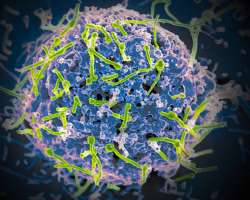Ebola In Nigeria

Cases of the Ebola virus disease in Nigeria were reported in 2014 as a small part of the epidemic of disease (commonly known as "Ebola") which originated in Guinea that represented the first outbreak of the disease in a West African country.
Nigeria lost some of her brilliant professionals to EVD in 2014. Ebola is infectious diseases that claim many lives during 2014 and a lot of people were victims of the virus. It was epidemic outbreak during that period, especially in some states in Nigeria. Worthy of notes is the late senior physician, Dr. Stella Adadeuola who handled the treatment of the index cased.
Some may wonder why there were so many casualties during that period. The reason is simple; Ebola is a highly infectious disease, such that one can contact it just by touching the surface that an infected person had touched previously.
Ebola is regarded in the medical world as the deadliest virus on earth, not only because it has no known cure yet, but also because it is one of the World’s lethal infections. It could kill within hours or few days of symptom onset, whether an infected person gets treatment or not.
The initial symptoms of the viral disease can include sudden fever, intense weakness, muscle pain and sore throat; and it can later progress to vomiting, diarrhea and, in some cases, internal and external bleeding.
Scientists note that the fearful aspect of the disease is that it is highly infectious. It has killed both doctors and patients alike. It does not respond to any vaccine. It can live in the body system of an infected person for two days to three weeks without any symptoms.
Worse still, Ebola is difficult to diagnose. Doctor’s note that by the time the symptoms start to manifest in an infected person, it is often too late to stop the spread of the virus to viral organs of the body. The best treatment affected person’s get is therapy.
The main host of the virus is relatively unknown; however, there is enough scientific evidence to show that Ebola virus can be contracted by person’s handling sick or dead infected wild animals, including chimpanzees, gorillas, monkeys, forest, antelope and fruit bats.
Ebola virus can be spread through close contact with the blood, body fluids organ and tissues of infected animals; direct contact with blood, organ or body secretions of an infected person. The transmission of the virus by other animals like monkey and chimpanzee cannot be ruled out.
Those at the highest risk of contracting the disease include health care workers who treat patients without taking necessary precautions against infections; and families or friends of an infected person who could be infected in the course of feeding, holding and caring for the sick.
One could contract the virus from an infected person as long as their blood and secretions contain the virus in some cases, up to seven weeks after they have recovered.
Even those who come in contact with the body fluids of a person killed by this virus are not exempted. Though there is no specific treatment for the disease, people with symptoms including bleeding from the eyes, mouth, nose, rectum and ear; or those suffering from fever, malaria and cholera should report to the health centers closest to them, where they would be admitted for special care and treated.
Hunters and those who eat or handle game meat of monkeys and chimpanzees are also at risk, experts say; that is why the World Health Organization warns against consuming raw game meat and forbids any contact with infected bats, monkeys and apes, saying that these game meats were considered delicacies in the areas where the outbreak started.
The importance of washing one’s hands with soap and water to get rid of germs, bacteria and other viruses cannot be overemphasized.
This age-l9ng habit has been proved to reduce the risk of getting infections by more than 60 percent. Many people are aware of washing hands, but what we are saying is that you should use soap or disinfectant when you wash hands. That is what will kill the bacteria or virus.
Also, the hand is the means by which most infection is contracted. And the average person touches his/her mouth at least ten times a day. Imagine if you had touched an infected person who touches his/her mouth at least ten times a day unknown to you and you don’t wash your hand before eating, you have introduced a virus into your body just by being negligent.
Science has proved that 70 percent of infections are contracted via the mouth through the hands. If you can’t access potable water, you can always improvise with hand sanitizers. They are portable, which means you can carry one in your bag, car and in your office locker.
